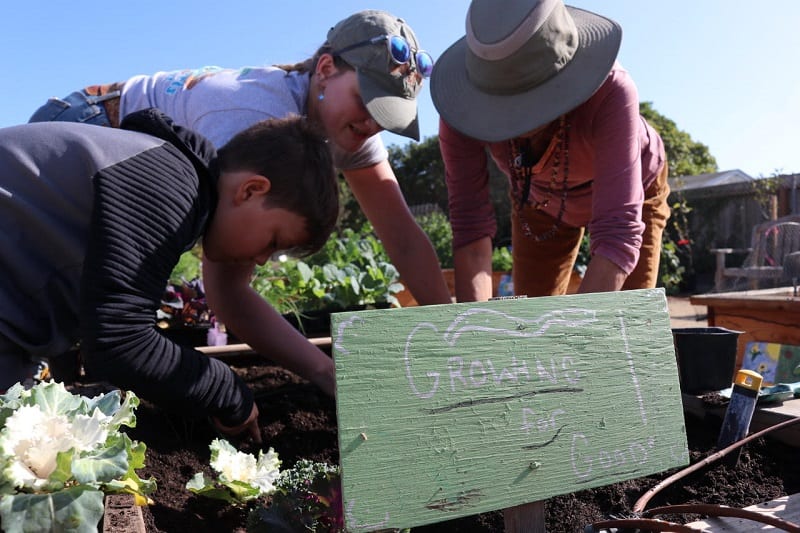

Nicole M. Young, MSW
April is the Month of the Young Child and Child Abuse Prevention Month, which is a good opportunity to remind ourselves that 1) raising happy, healthy children is both exhausting and rewarding, 2) every parent struggles, feels unprepared, or worries they’ve failed at parenting at some point, and 3) everyone in the community can play a role in making sure children and families have the resources and support needed to thrive.
This monthly article provides tips for families raising children, based on the world-renowned Triple P – Positive Parenting Program, available to families in Santa Cruz County. If you have a question or idea for a future column, please email me at triplep@first5scc.org.
Dear Nicole, My family needs help. My partner and I both work two jobs but can barely make ends meet. We’re constantly stressed and hardly spend time together as a family. Whenever we’re together, we end up arguing. My kids fight with each other, I lose my patience and yell, and then my partner yells at me for yelling at the kids. It’s become a daily pattern that we can’t seem to stop, even though we all love each other and want to have good communication and relationships. What can we do to change this? Ronnie
Dear Ronnie, First, you’re not alone! Many families experience similar types of stress and conflict. Second, it’s great you’re reaching out for help. Parents are often embarrassed or afraid to talk about parenting and relationship difficulties out of fear of being judged as a “bad parent.” The good news is that there are small steps you can take that can have a big impact on your family’s communication and relationships. Here are 30 small steps to try – one for each day of the month:
- Do something just for you. Read, meditate, exercise, socialize, or do nothing. You choose.
- Go for a walk or hike. Go alone (see #1) or with your family.
- Make a meal together. Let your children pick the food and help make it.
- Go to a beach or park. Fresh air and physical activity can work wonders.
- Do a chore together. Turn it into quality time by talking or listening to music together.
- Play games – cards, board games, video games or make up your own game.
- Eat together. Turn off electronic devices and talk about how everybody’s day went.
- Volunteer together. Teach your children to help other people, animals, or the planet.
- Explore together. Go somewhere local that you’ve never been before.
- Tell stories. Share true or make-believe stories.
- Look at family photos and videos. Talk about your favorite memories.
- Plant a family garden. Let each child pick something to plant.
- Read together out loud or silently while sitting next to each other.
- Give each child quality time before bed. Snuggle, read, or hug before the lights go out.
- Have an indoor or outdoor picnic. All you need is a blanket and food!
- Teach each other something new. Share a fun fact or special talent.
- When your child needs something, stop what you’re doing, make eye contact, and give your full attention. They’ll learn to do the same.
- Color together. It doesn’t have to be fancy, but art activities can be very soothing.
- Play music. Sing and dance together (or alone, see #1).
- Attend community events. Look in local newspapers and calendars to find fun, free events.
- Go on “dates.” Do something special (and simple) with each child. And your partner.
- Write notes or draw pictures that show you care about each other.
- Visit your local library for books, story time, or homework help.
- Have a family movie (or TV) night. Relax and laugh (or cry) together.
- Go on a walking tour. Pick a few local places, then go on a walk to find them.
- Look at the stars. Watch the stars appear, then look for shooting stars.
- Read maps together. Share your dreams about where you’d like to travel.
- Have a family meeting. Resolve problems or talk about everybody’s plans for the week.
- Hang out. Just sit, relax, and enjoy each other’s company.
- Give affection every day. Give hugs, high 5s, or pats on the back to show you care.
Final Thoughts: Remember that raising children isn’t easy, but no one should have to struggle alone. Small steps make a big difference. Try these ideas and add to the list!
Nicole Young is the mother of two children, ages 16 and 20, who also manages Santa Cruz County’s Triple P – Positive Parenting Program, the world’s leading positive parenting program. Scientifically proven, Triple P is made available locally by First 5 Santa Cruz County, the Santa Cruz County Health Services Agency (Mental Health Services Act) and the Santa Cruz County Human Services Department. To find a Triple P parenting class or practitioner, visit http://triplep.first5scc.org, www.facebook.com/triplepscc or contact First 5 Santa Cruz County at 465-2217 or triplep@first5scc.org.



